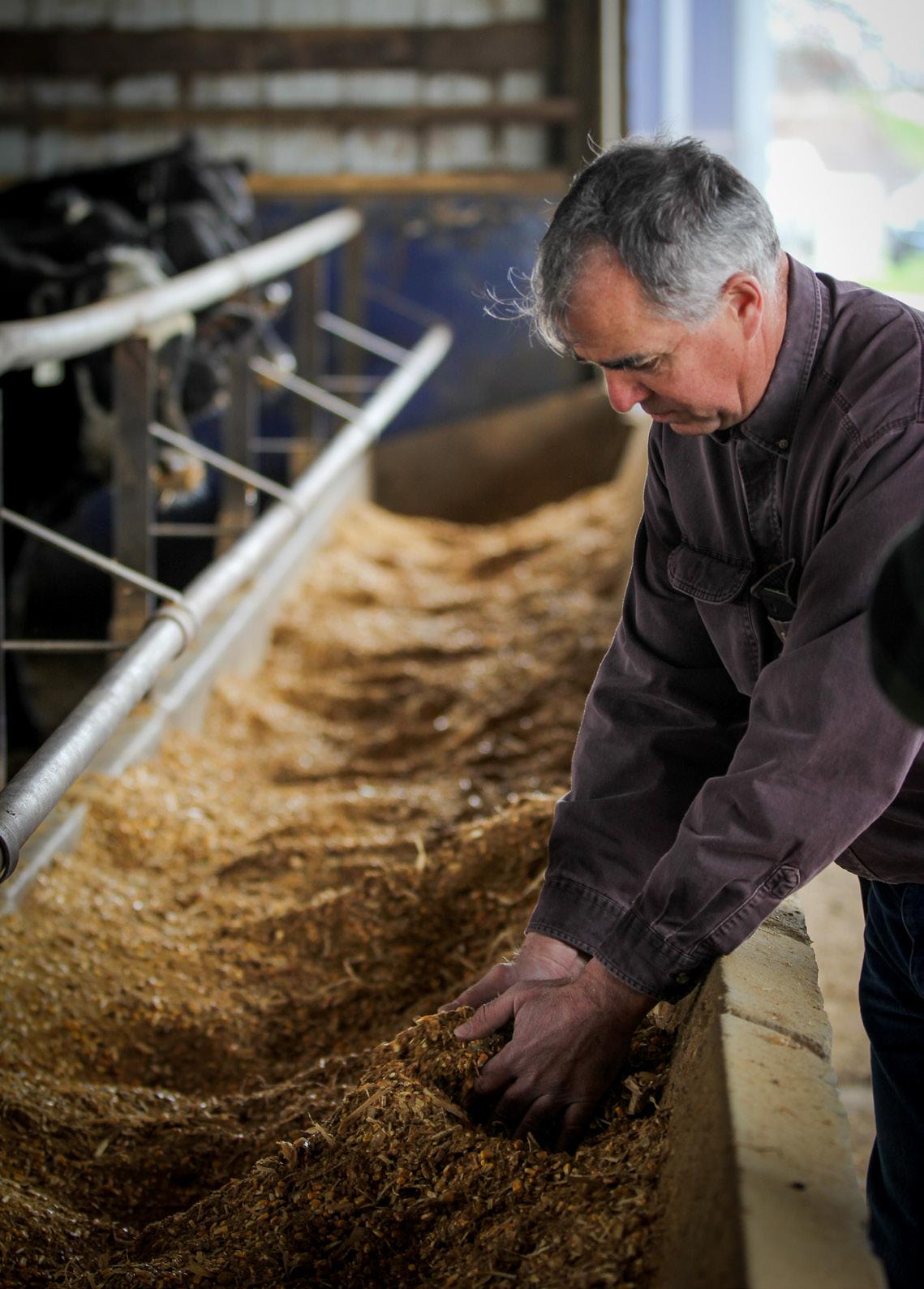
10 minute read
Farm Family of the Year
Beef Industry Immersion Pays Off
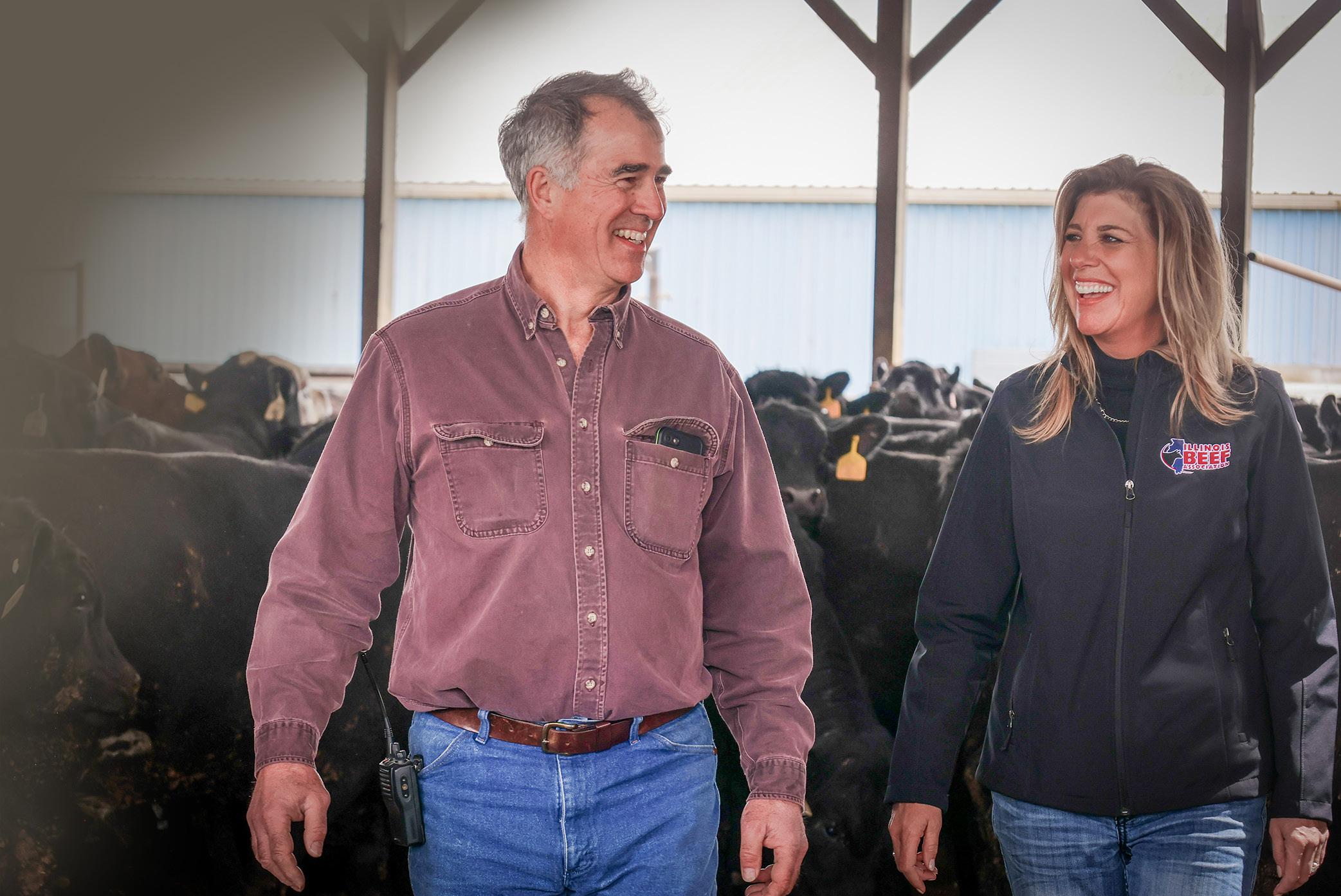
Advertisement
Farm Family of the Year Finds Involvement Cultivates Success
by Barb Anderson
Whether at work in the feedlot or fields, or raising their children and awareness of agriculture, Jamie and Larisa Willrett are all-in when it comes to managing for sustainable success. The owner-operators of J. Willrett Farms were recognized as the 2022 Illinois Beef Association’s Farm Family of the Year for their long-standing commitment to the cattle feeding industry, continued focus on the beef consumer and the legacy of association contributions they have made.
Jamie and Larisa, together with their children, Justis, Olivia and Sawyer, operate their diversified cattle feeding business and grain farming enterprise near Malta in DeKalb County.
“In my mind, the Willretts are the beef industry,” says Mike Martz, past honoree, neighbor and friend. Mike and Lynn Martz of Larson Farms are based in Maple Park, also in DeKalb County. “Their family represents and works in so many aspects of the beef industry. Sharing information about how they operate allows other beef producers in Illinois to pick up ideas about what works. Honoring such leaders recognizes their contributions and gives credit where credit is due.”
Foresight Fuels Longevity
The Willrett family immigrated from Germany and began farming in northern Illinois in the 1850s. J. Willrett Farms was established in 1942 by Jamie’s grandfather. Lifetime farmer and Jamie’s dad, Jim, assumed the reins and started concentrating on beef production in the 1960s, building some of the first confinement feeding sheds in the area.
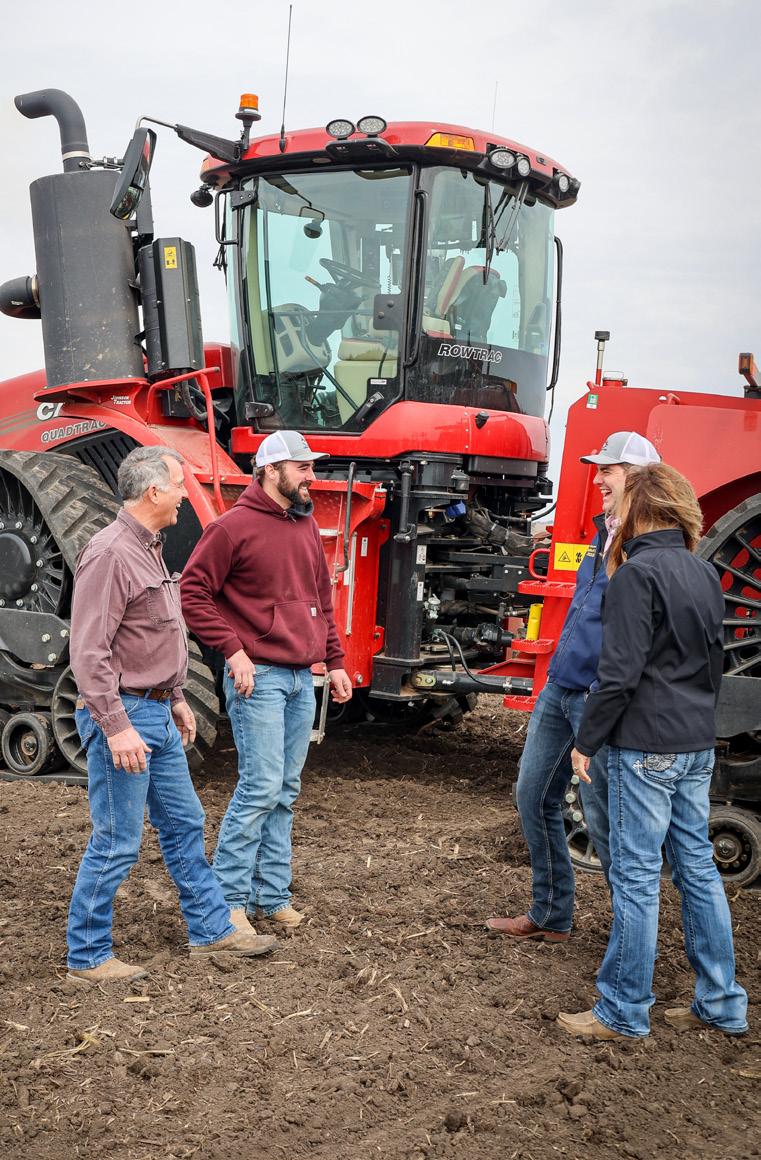
Jamie, Justis, Sawyer and Larisa Willrett
Jamie returned to the farm with an ag economics degree from the University of Illinois in the early 1980s, helping to build, remodel, innovate and grow the operation. Today, they have a net annual feeding capacity of 12,000 head and farm 4,000 acres of corn and soybeans.
“I was born and raised here. I grew up managing 4-H cattle and participating in FFA,” says Jamie. “I have been involved in the operation ever since I came back to the farm after college.”
The 1980s was a challenging economic time for agriculture. Jamie remembers a lot of neighbors that chose to leave agriculture because it wasn’t profitable.
“When you see these things and get a little thicker skin and grayer hair, you learn to survive,” says Jamie. “Agriculture becomes ingrained in you. I like the challenges, I like the opportunities and I never really considered doing anything else.”
Jamie appreciates the synergies they have developed between their grain and cattle enterprises. Most of the grain is fed to the cattle. Animal manure provides fertility back to the crop ground. The Willretts feed primarily steers and restock them twice a year to sell to regional processors.
Wife Larisa has a different, but not unrelated, background. Originally from Montana, her parents were both journalists with a family ranch in western Montana. She went to school at Colorado State University to become a veterinarian but switched to production agriculture. She earned a master’s degree in agriculture, doing some of her graduate work in Springfield collecting data from grocery store meat cases. She subsequently worked for the National Cattleman’s Beef Association. Former Illinois Beef Association executive, John Butler, introduced her to Jamie.
“Through my education, I worked in a feedyard, with a cow-calf operation and was certified to artificially inseminate. I also worked for Extension, and I have a freelance editing business,” she says. “I have been a staff member within the industry and now a producer. I knew this is what I wanted to do once I met Jamie and his family; to be part of an agriculture operation in Illinois.”
Following in the Footsteps
The Willretts’ children, all young adults, also are proponents of the beef industry. Oldest son, Justis, returned to the family farm after college and serves on the DeKalb-Kane County Cattlemen’s Board. Daughter, Olivia, is a risk management analyst for Five Rivers Cattle Feeding in Colorado. Youngest son, Sawyer, is serving on the Nebraska Collegiate Cattlemen’s Board while finishing his bachelor’s degree at the University of Nebraska-Lincoln.
“Our intention when we had children was for them to follow their dreams and do what they want to do,” says Larisa. “Obviously, they have the opportunity to come back. That was one of our goals; to make the farm big enough to support them should all three decide to return. Raising children who want to feed the world is a very noble cause and I’m proud we have children who are interested in being part of this
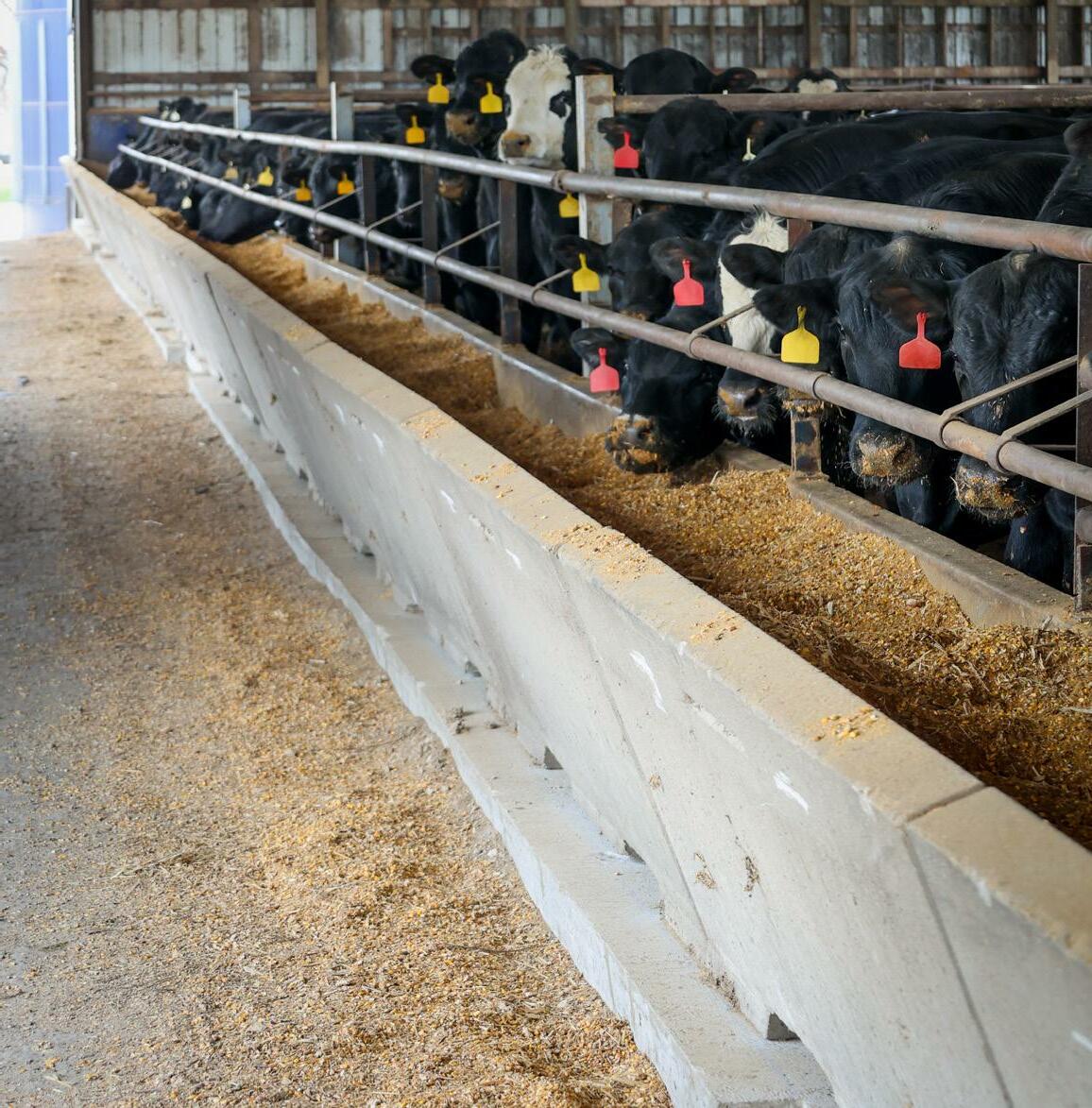
industry. I hope the kids each bring something to the table that will contribute to the future, add something to the farm for the next generation behind them.”
Sawyer agrees with his mom. Growing up on the farm gave him great perspective.
“I know where I come from and what my family has been doing the past five generations. I may take a role within our family operation and elsewhere,” he says. “I see myself doing more than cattle feeding because I want to get involved in the many different aspects of agriculture.”
Jamie says the kids were always active in the farm’s operations, raising cattle for 4-H and FFA projects and even managing cows, giving them a conception-to-consumption experience.
“We taught that agriculture’s not a transient business. You don’t get in and get out,” says Jamie. “We enjoy what the kids have done, watching them grow. When you immerse in agriculture, your farm becomes you – the successes, opportunities, experiences wrap your whole family up.”
It also teaches life skills. “There’s a certain skillset you have to develop when you farm with your family. You have to be quick to forgive when you work together, but it also offers many opportunities for teaching one another about what you learn and what you enjoy,” says Larisa. “It takes a lot of patience and selflessness to help every generation grow and make the farm better. We have a responsibility, and so do our children, to our ancestors to continue the legacy.”
Leadership at All Levels
Jamie and Larisa have been active members and leaders in the Illinois Beef Association, the National Cattlemen’s Beef Association and the DeKalb County Farm Bureau. And they have always taken their children to industry meetings and conventions, which they believe has helped spark their early interest in volunteering their time and talents to trade associations.
“My dad was involved with beef organizations, and I saw the people he met and the decisions they make have an impact,” says Jamie. “I’d hear about those decisions and how they affect the industry. That is why it is important to be involved and try and mold the future and the future business climate. There are a lot of challenges with the beef business today.”
Jamie is a past president of the Illinois Beef Association and served on both the National Cattlemen’s and CattleFax boards. Mike Martz talked frequently with Jamie during this leadership time, and even became involved with Illinois Beef at the encouragement of Jamie.
“I owe Jamie a lot for getting me involved with the association and on the board. It provided me with great exposure and industry perspective,” says Martz. “I saw Jamie in action at national meetings, navigating tough industry issues and was always impressed with his leadership.”
Larisa is taking her turn now as an Illinois Beef Association at-large policy director.
“It was a conscious decision we made for Jamie to get involved. There is a commitment when you’re a young married father to do all that traveling,” says Larisa. “Jamie has contributed to the industry, and I’m proud of him for that. Being invited to be on that Illinois Beef Association Board was a real honor for me, too, and I hope I contribute something of value as well.”
Jamie offers this advice for future generations of beef leaders: “Keep your eye on the ball. Understand what’s important to the industry, what’s important to you and what’s important in life,” he says. “Maybe take a little more time to smell the roses and develop some side hobbies to keep you busy. If you do those things and love what you do, you’ll be successful.”
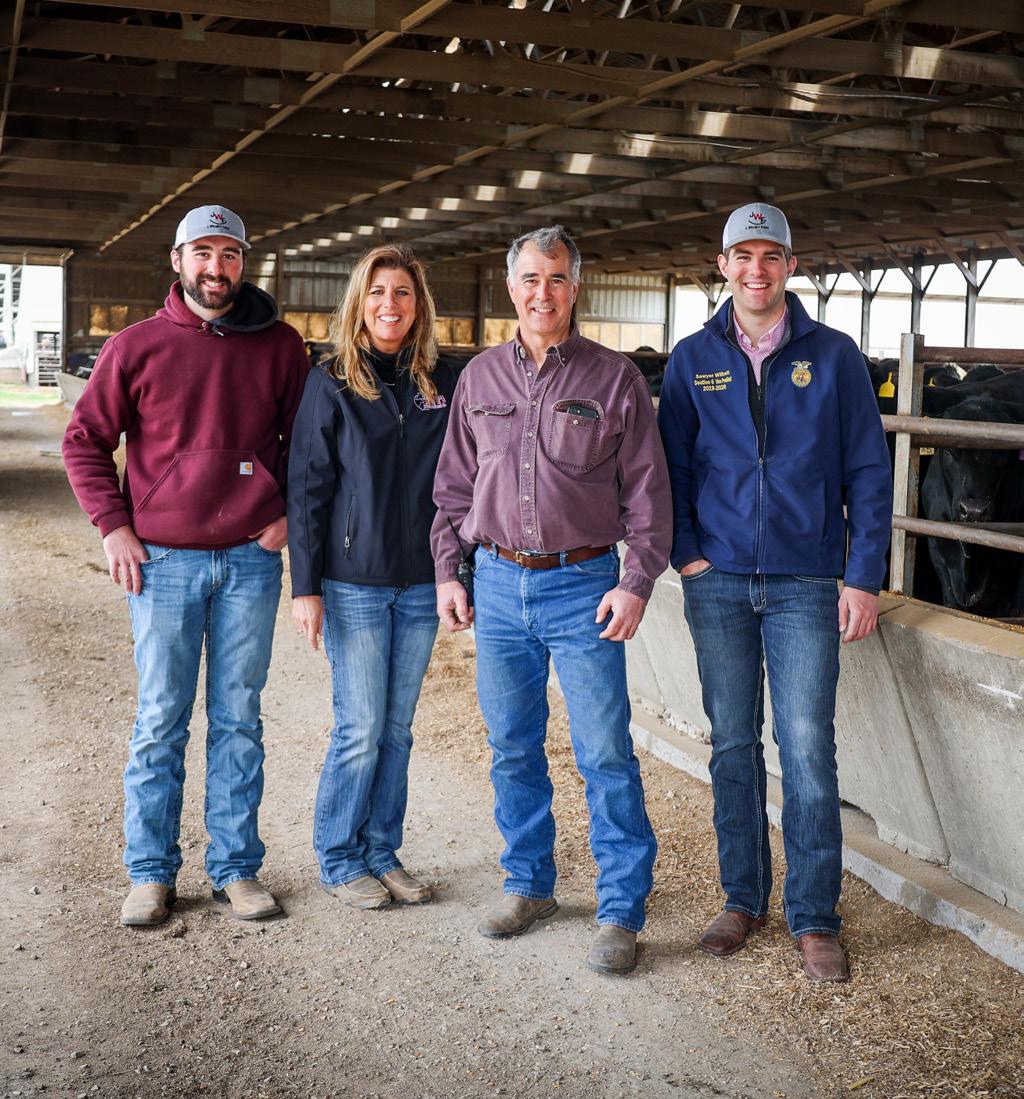
All About the Future
J. Willrett Farms plans to maintain its success within the beef industry by utilizing new technology that can provide continued improvements in efficiency and help them focus on consumer quality.
“That’s the trend,” says Larisa. “Since we took over, there is more technology to help you be far more efficient. We’ve had adversity, tightened the belt and plowed through with optimism. But if you don’t learn to be more efficient, you won’t be in the game in 10 years.”
Jamie adds, “There’s a fine line between the leading edge and the bleeding edge with new technology,” as they navigate becoming more efficient with an eye on economics. For example, the Willretts started an ultrasound business in 1996 with Larson Farms, adopting technology developed at Kansas State University to take physical animal characteristics and project market dates that would optimize quality for the consumer.
“That was a big step for us,” says Jamie. “We started providing the data to our packers, and they saw what a consistent product we could produce. That continues today.”
He believes technology that helps producers provide a more consistent, high-quality product for consumers is one of the greatest assets of the industry going forward as well.
The Willrett Family Justis, Larisa, Jamie & Sawyer
“I hope the industry continues to position itself as a number-one-protein, center-of-the-plate product. We’ve been through some challenging times, but we’re certainly providing consumers a better product than in the past. And we’re seeing consumers respond with demand,” he says. “I hope higher prices for beef contribute all the way down through the chain so we can see this industry grow in the future and actually expand consumer demand and production. That will provide a lot of livelihoods for many people in this industry for years to come.”
Ultimately, Jamie and Larisa are thankful for the many ways the beef industry has provided for their family and sustains their livelihood for future generations to enjoy.
“You have got to like what you do. You have to be responsible to your industry, your operation and your family and try to always do the right thing,” says Jamie. “Success comes through hard work and long hours, and those efforts will pay off in the long run when you make smart business decisions, prudent business decisions, along the way. You don’t have to be right all the time. But you do have to have a focus in mind and work hard to try and achieve it.”
